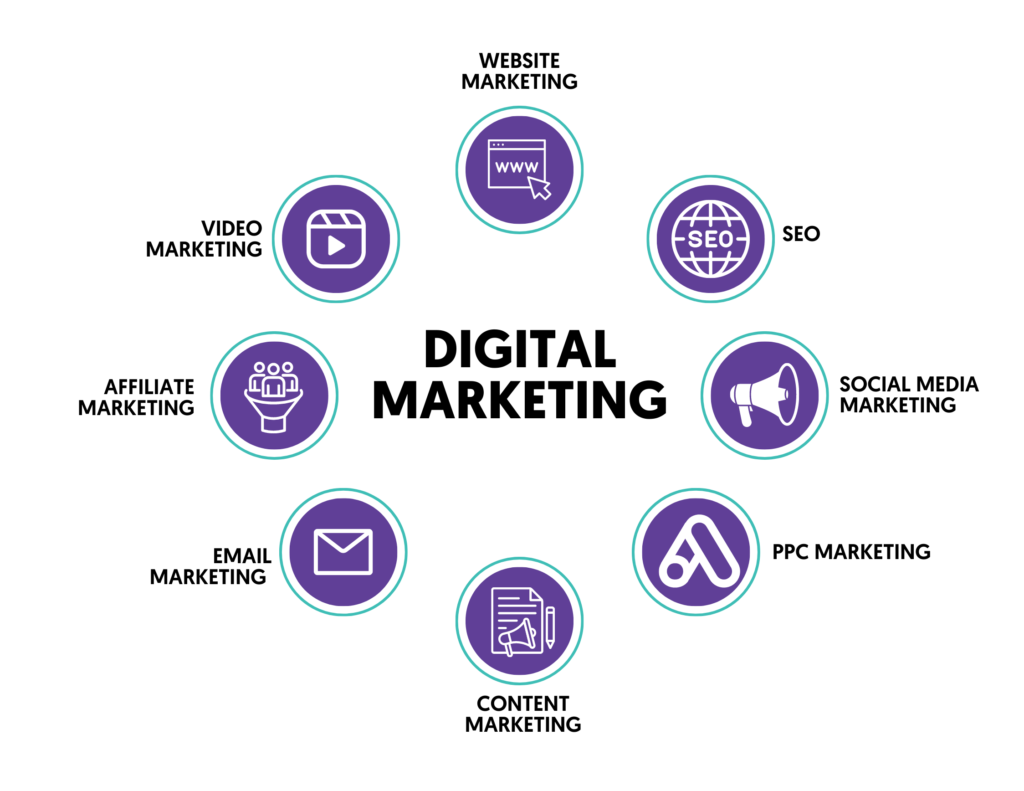What Does a Digital Marketer Do?
In today’s fast-paced digital world, the role of a digital marketer is more critical than ever. With businesses increasingly shifting their focus online, the need for skilled professionals who can navigate the digital landscape has never been greater. But what exactly does a digital marketer do? In this blog, we’ll explore the multifaceted responsibilities of a digital marketer, breaking down their role into key areas and functions.

1. Understanding the Digital Landscape
A digital marketer’s journey begins with a thorough understanding of the digital landscape. This includes being well-versed in various online platforms and tools, from social media to search engines. They need to stay updated with the latest trends, algorithms, and technological advancements that impact digital marketing.
2. Developing Digital Marketing Strategies
One of the core responsibilities of a digital marketer is to develop effective digital marketing strategies. This involves setting clear objectives, understanding the target audience, and selecting the right channels to reach them. A well-crafted strategy ensures that marketing efforts are aligned with business goals and are designed to maximize ROI.
3. Search Engine Optimization (SEO)
SEO is a crucial aspect of digital marketing. Digital marketers optimize website content to improve its visibility in search engine results pages (SERPs). This involves keyword research, on-page optimization (such as meta tags and headings), off-page optimization (like link-building), and ensuring a good user experience. The goal is to increase organic traffic and improve the website’s search engine ranking.
4. Content Creation and Marketing
Content is king in the digital world. Digital marketers create and manage content that resonates with the target audience. This can include blog posts, articles, infographics, videos, and social media posts. They focus on creating valuable, relevant, and engaging content that drives traffic, generates leads, and fosters brand loyalty.
Social media platforms are a vital component of digital marketing. Digital marketers manage social media accounts to build and maintain a brand’s online presence. They develop social media strategies, create and schedule posts, engage with followers, and analyze performance metrics. Effective social media management helps brands connect with their audience, enhance brand awareness, and drive traffic to their website.
Email marketing remains a powerful tool for digital marketers. They design and execute email campaigns to communicate directly with potential and existing customers. This involves creating compelling email content, segmenting email lists, personalizing messages, and analyzing campaign performance. Email marketing aims to nurture leads, promote products or services, and increase customer retention.
7. Pay-Per-Click (PPC) Advertising
PPC advertising is another key area of digital marketing. Digital marketers manage paid advertising campaigns on platforms like Google Ads, Facebook Ads, and LinkedIn Ads. They create ad copy, choose target keywords, set budgets, and monitor campaign performance. The objective is to drive targeted traffic to the website and generate conversions while optimizing ad spend.
8. Analytics and Data Analysis
Data is the backbone of digital marketing. Digital marketers use analytics tools (such as Google Analytics) to track and measure the performance of marketing campaigns. They analyze data to understand user behavior, assess campaign effectiveness, and make data-driven decisions. This helps in refining strategies, improving ROI, and achieving marketing goals.
9. Conversion Rate Optimization (CRO)
Conversion Rate Optimization focuses on improving the effectiveness of a website or landing page to convert visitors into customers. Digital marketers analyze user behavior, conduct A/B testing, and make data-driven adjustments to enhance the user experience and increase conversion rates.
10. Influencer and Affiliate Marketing
Influencer and affiliate marketing have become popular strategies for reaching new audiences. Digital marketers identify and collaborate with influencers or affiliates who can promote the brand or product. They manage relationships, track performance, and ensure that these partnerships align with the brand’s goals and values.
11. Customer Relationship Management (CRM)
CRM tools help digital marketers manage interactions with current and potential customers. They use CRM systems to track customer behavior, segment audiences, and personalize marketing efforts. This ensures that communications are relevant and timely, enhancing the overall customer experience.
12. Staying Compliant and Ethical
Digital marketers must adhere to legal and ethical standards, including data privacy regulations like GDPR and CCPA. They ensure that marketing practices are compliant with these regulations and that customer data is handled responsibly and securely.
13. Continuous Learning and Adaptation
The digital marketing landscape is ever-evolving. Digital marketers must engage in continuous learning to keep up with new tools, technologies, and trends. They attend workshops, webinars, and industry conferences to stay ahead of the curve and adapt their strategies accordingly.
Conclusion
In essence, a digital marketer wears many hats and plays a crucial role in shaping a brand’s online presence and driving its digital success. From strategizing and content creation to data analysis and compliance, their responsibilities are diverse and dynamic. As digital channels continue to grow in importance, the role of the digital marketer will only become more pivotal in helping businesses thrive in the digital age.
By understanding and mastering these various aspects of digital marketing, professionals can effectively contribute to their organization’s growth and success in an increasingly competitive online environment.


